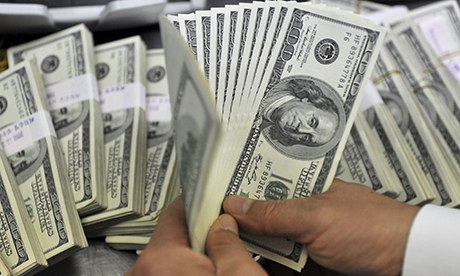Bob Ward has identified several errors in Richard Tol's IPCC economics chapter, but the economic need for action is clear
by John Abraham, "Climate Consensus - The 97%," The Guardian, April 30, 2014

Despite errors in the IPCC report downplaying the costs of climate change, the economic case for preventing additional global warming is clear.
I have frequently criticized flawed analyses from economists or political scientists regarding climate change and its impacts. An excellent recent criticism was written by Bob Ward from the Grantham Research Institute on Climate Change and the Environment.
Ward has been in a public battle to achieve corrections relating to the work of economics professor Richard Tol. Richard Tol is at the University of Sussex; he is well-known in the climate circles as someone who has been a proponent arguing for potential benefits from modest climate change to society and economies.
Back in October 2013, Ward reviewed Tol's work after it was publicly cited by Matt Ridley in the Spectator. I had also criticized Matt Ridley's writings as not representing the views of the scientific community.
Ward's findings were striking. He reported,
"Viscount Ridley drew primarily on an academic paper by Professor Tol which was published in the Journal of Economic Perspectives. The study drew together a number of estimates of the aggregate economic impacts of climate change and concluded that global warming of up to 2.2 °C would have a net beneficial impact for the worldHowever, when I examined Tol's paper in detail, I discovered that he had made a number of errors, wrongly plotting studies which had found net negative impacts as if they were positive benefits. Of the 14 data listed in Table 1 and plotted in Figure 1 of the paper, at least four were wrong."
When you put all of these mistakes together, there was only one of Tol's studies that showed a significant positive impact from climate change. That study, published in 2002 suggested a 2.3% effect on global wealth with a 1 °C temperature rise. Even there however, Tol admitted that many impacts of climate change were omitted which will change the results. When I challenged Professor Tol on this point, he identified a second paper which showed a very small potential positive economic impact of 0.1% as climate change progresses, which I think we can agree is not significant.
Ward "exchanged email with Professor Tol to confirm that his 2009 paper contained mistakes, but he refused to give any undertaking to write to the journal to correct them." Ward wrote,
Ward found that Tol made multiple errors in his 2013 publication. In the end, it was still only Tol's own work which showed significant economic benefits with climate change.
In January 2014, Ward extended his investigation to a leaked version of the final draft of the IPCC Working Group 2 report. There, chapter 10 had a section which was largely based on Tol's own work. This material had not appeared in previous drafts of the report and so had not been made available to expert reviewers of the report, like Ward. The final draft contained multiple errors in Table 10.B.1 and in Figure 10-1; some of which stemmed from the Tol 2013 article. And there was still only the Tol study that showed significant positive impacts, yet the text of chapter 10 stated that "Estimates agree on the size of the impact (small relative to economic growth) but disagree on the sign."
So Ward wrote to Professor Tol, authors of the IPCC report, and editors of the journals where the errors had appeared to seek corrections. He also asked the journal editors to make available the calculations used by Tol for his papers, so that the rest of the results could be checked for further inaccuracies.
As Ward recounted in a commentary,
"Disappointingly, none of the journals have so far secured an agreement from Professor Tol to make his calculations available, which means that a number of the data included in Chapter 10 of the IPCC report remain unverifiable.For this reason, I remain concerned about the following statement from the Summary for Policymakers from the report: "the incomplete estimates of global annual economic losses for additional temperature increases of ~2 °C are between 0.2 and 2% of income (±1 standard deviation around the mean)". These figures are drawn entirely from Professor Tol's 2013 paper, and without independent verification of the data currently being possible, I do not regard them to have been proven robust.Furthermore, the version of Chapter 10 that has been published on the IPCC's website is the draft that was distributed to governments in October 2013, and still contains at least three erroneous data points in Table 10.B.1 and Figure 10-1. The text of Section 10.9.2 remains a highly misleading description of the data: "Estimates agree on the size of the impact (small relative to economic growth) but disagree on the sign."
As I indicated earlier, I wrote to Richard Tol and put some of these complaints to him. Of the six complaints I posed to him, he agreed with three. The only two items he took issue with have facts which do not support his view. In particular, regarding chapter 10 of the IPCC report, he stated that Bob Ward was right but that,
"Earlier drafts discuss the same material but without a comprehensive assessment. Peculiarly there was a misattribution of estimates; and one key new study was overlooked."
It is time for us to move beyond these endless debates and begin working together on solutions that are cost effective ways to deal with climate change. The more we delay the greater will be the future costs to us and our children.
• This article has been amended to correct the number of complaints that Richard Tol agreed with – it previously said four.







No comments:
Post a Comment